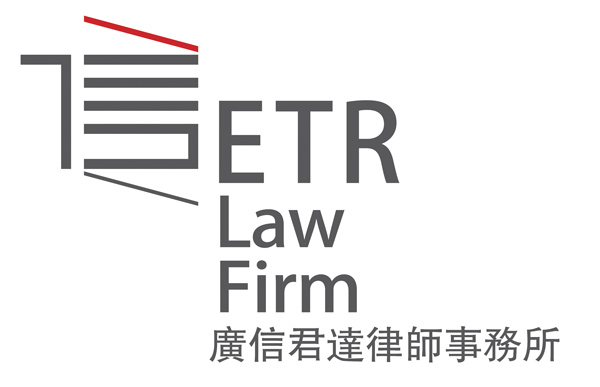The Guangdong government this year published its plan to replace the certificate of no violation with credit reports, allowing companies to print out their own reports showing they have not broken any laws or regulations and meaning they no longer have to visit multiple departments to apply for the certificates.
The Implementation Plan for Credit Report Replacing Certificate of No Violation of Laws and Regulations for Enterprises was part of the reform of “streamlining administration, delegating power, strengthening regulation and upgrading services”.
The reform, also covering taxation, drug regulation, housing provident funds and work health and safety, is a positive step towards efficiently using data to streamline the administrative process, lessening the burden on companies. The new business environment is expected to be more favourable for companies to carry out listing, financing and other business activities.

Partner
ETR Law Firm
Certificates of no violation
Under article 18 of the Measures for the Administration of Initial Public Offerings and Listing of Stocks, companies wanting to list must be able to show that they have not “been subject to any administrative penalty for seriously violating regulations of industry and commerce, taxation, land, environmental protection, customs or other laws or administrative regulations in the past 36 months”.
The regulations require that the issuer’s business activities must not seriously violate any laws or regulations, otherwise the issuance would probably be blocked. Additionally, according to the requirements under the Standards for the Contents and Formats of Information Disclosure by Companies Offering Securities to the Public No. 12 – Legal Opinions and Lawyers’ Work Reports on Public Offering of Securities, the issuer’s counsel, when preparing their work reports, must give their legal opinion on whether the issuer has operated legally and in compliance with regulations and disclose all such information.
For this reason, the issuer is compelled to obtain a certificate of no violation from the local authorities of industry and commerce, taxation, land, environmental protection and customs, to serve as one of the bases for the counsel’s legal opinion. The problem, however, is that the above-mentioned five departments often cannot comprehensively cover all the business activities of the issuer. Depending on the characteristics of the industry it operates in and its business scope, the issuer may also need to obtain such certificates from local departments of medical products administration, emergency management, housing provident fund, human resources and social security, administration of foreign exchange, urban management or the Development and Reform Commission.

Paralegal
ETR Law Firm
Cumbersome process
When applying for listing, besides the main entity to be listed, its wholly owned, majority-owned and other substantially owned subsidiaries are also under scrutiny. All involved companies must then obtain certificates of no violation from a dozen government departments. For each relevant department, the issuer would have to prepare the application documents, make appointments and go through a lengthy review process. Sometimes further delays are caused by unclear department instructions or mishandling by the company’s personnel. It could take as long as two months before all certificates are finally assembled.
Apart from the hefty time cost, there are also cases where the local department has never established a consistent application and approval process, or is unfamiliar with how such certificates are issued. The worst possible scenario for the issuer would be if the competent department refuses to issue the certificate according to administrative rules and regulations.
In 2020, an ecology and environment department refused to issue the certificate to an applying company, on the grounds that the Notice of the Ministry of Environmental Protection on Reforming and Adjusting the Work System of Listing Environmental Protection Verification, issued in 2014, required the environmental protection authority to cease accepting and conducting environmental protection reviews for the purpose of public listing, and stop issuing relevant documents including the certificate of no violation.
Afterward, the issuer’s counsel and securities trader explained to the ecology and environment department that the above-mentioned regulation had been abolished in the Decision of the Ministry of Environmental Protection to Repeal Certain Departmental Rules and Regulatory Documents on Environmental Protection in 2016, hence the legal basis no longer existed. However, the department again refused to issue the certificate, replying that, even though the law had been repealed, there were no other laws or regulations in effect authorising them to issue the certificate.
All companies looking to go public must bear a sizeable cost and communicate with key departments to obtain such certificates. To make matters worse, laws and regulations alternate from time to time, and the competent departments may suffer personnel or responsibility changes, which means certain functional systems may not have been established or supported by an updated system. This presented another major potential obstacle for companies to obtain the certificates.
Vision for reform
In the annex of the implementation plan, the departments included for data sharing are the provincial development and reform commission, human resources and social security department, housing and urban-rural development department, culture and tourism department, emergency management department, administration for market regulation, taxation service, fire and rescue department, medical products administration and healthcare security administration, capable of issuing certificates of no violation in 11 areas. This substantially covers the certificates required for prospective listing companies, saving a massive amount of expense and time. Companies can now enjoy a much more flexible timeline for obtaining the certificates in the application process, which has become more time-efficient overall.
On the other hand, the reform has yet to include the Ecology and Environment Department, Customs and the Administration of Foreign Exchange in the scope of data sharing. It is common for prospective listing companies, often being sizeable players in their own sectors, to take part in overseas dealings on some level, such as exporting products or importing raw materials. This makes them easily subject to the regulation of the Customs and the Administration of Foreign Exchange. Environmental protection is an issue that almost every applying company must address. We look forward to seeing data from more departments included in the online credit report that companies could easily access with a printer.
We hope to see the scope of reform expand in the future to be more inclusive in its data sharing. Let data do the legwork instead of people, to allow the prospective listing companies and their intermediaries to dedicate more time to their core business matters.
Lam Yee Hung is a partner and Huang Qianyuan is a paralegal at ETR Law Firm

10 & 29/F, Chow Tai Fook Finance Centre
No.6 Zhujiang Dong Road, Tianhe District
Guangzhou 510623, China
Tel: +86 20 3718 1333
Fax: +86 20 3718 1388
Email:



























